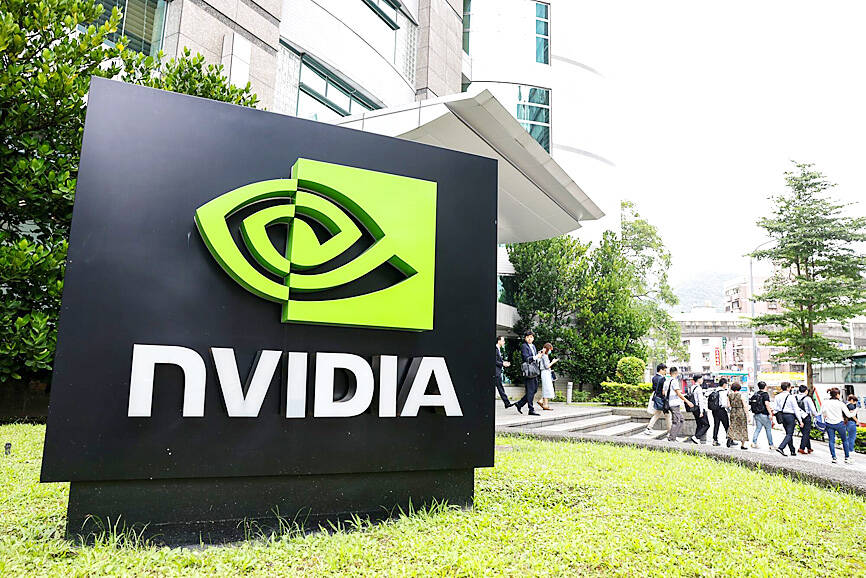Nvidia Corp, the world’s most valuable chipmaker, is “extremely likely” to invest in Europe, chief executive officer Jensen Huang (黃仁勳) said.
Huang said European Commissioner for the Internal Market Thierry Breton said “that Nvidia should invest a great deal more in Europe and that Europe is going to be a wonderful place to build the future of Nvidia.”
The pair met on Friday as part of Breton’s discussions about content moderation and artificial intelligence with some of the largest tech companies in Silicon Valley.

Photo: Bloomberg
Nvidia’s value has jumped as its graphics processors have become the most popular for data centers needed to power generative artificial intelligence. The company’s sales in its data center unit gained 41 percent to US$15 billion last year.
At the same time, the US, the EU, Japan and India have agreed to spend more than US$100 billion in subsidies to attract the likes of Taiwan Semiconductor Manufacturing Co (台積電), Intel Corp and Micron Technology Inc.
Intel last week announced plans for new plants in Germany, Israel and Poland, spurred by government incentives.
Nvidia would also look to invest in Europe, Huang said.
“The reason for that is Nvidia would like to be a global international company and what a better place to — and [who] can imagine a better place to invest,” he told reporters after meeting with Breton.
Breton invited Huang to continue the discussion in Brussels next month.
While the semiconductor industry still faces inventory adjustment issues in the second quarter, some IC designers are expected to benefit from the launch of new products, TrendForce Corp (集邦科技) said last week.
In particular, Nvidia is expected to see sales grow further in the second quarter because of its development of AI-related chips, and it could take the top spot in the global IC design market, TrendForce said.
Nvidia’s revenue in the first quarter rose 13.5 percent from a quarter earlier to US$6.73 billion.
That gave it a 19.9 percent share of the global IC design market to rank third-largest, TrendForce said in a report on Tuesday.
Smartphone IC designer Qualcomm Inc led this sector with revenue of US$7.94 billion, up 0.6 percent from a quarter earlier, giving it a 23.5 percent market share.
Wireless and broadband communication IC designer Broadcom Corp took the second spot with US$6.91 billion in revenue in the quarter, down 2.7 percent from a quarter earlier, to secure a 20.4 percent market share.
IC designer Advanced Micro Devices Inc ranked fourth with a market share of 15.8 percent on sales of US$5.35 billion, while MediaTek Inc (聯發科) remained the fifth-largest with sales of US$3.15 billion and a 9.3 percent market share, TrendForce said.

Application-specific integrated circuit designer Faraday Technology Corp (智原) yesterday said that although revenue this quarter would decline 30 percent from last quarter, it retained its full-year forecast of revenue growth of 100 percent. The company attributed the quarterly drop to a slowdown in customers’ production of chips using Faraday’s advanced packaging technology. The company is still confident about its revenue growth this year, given its strong “design-win” — or the projects it won to help customers design their chips, Faraday president Steve Wang (王國雍) told an online earnings conference. “The design-win this year is better than we expected. We believe we will win

Intel Corp chief executive officer Lip-Bu Tan (陳立武) is expected to meet with Taiwanese suppliers next month in conjunction with the opening of the Computex Taipei trade show, supply chain sources said on Monday. The visit, the first for Tan to Taiwan since assuming his new post last month, would be aimed at enhancing Intel’s ties with suppliers in Taiwan as he attempts to help turn around the struggling US chipmaker, the sources said. Tan is to hold a banquet to celebrate Intel’s 40-year presence in Taiwan before Computex opens on May 20 and invite dozens of Taiwanese suppliers to exchange views

Chizuko Kimura has become the first female sushi chef in the world to win a Michelin star, fulfilling a promise she made to her dying husband to continue his legacy. The 54-year-old Japanese chef regained the Michelin star her late husband, Shunei Kimura, won three years ago for their Sushi Shunei restaurant in Paris. For Shunei Kimura, the star was a dream come true. However, the joy was short-lived. He died from cancer just three months later in June 2022. He was 65. The following year, the restaurant in the heart of Montmartre lost its star rating. Chizuko Kimura insisted that the new star is still down

While China’s leaders use their economic and political might to fight US President Donald Trump’s trade war “to the end,” its army of social media soldiers are embarking on a more humorous campaign online. Trump’s tariff blitz has seen Washington and Beijing impose eye-watering duties on imports from the other, fanning a standoff between the economic superpowers that has sparked global recession fears and sent markets into a tailspin. Trump says his policy is a response to years of being “ripped off” by other countries and aims to bring manufacturing to the US, forcing companies to employ US workers. However, China’s online warriors